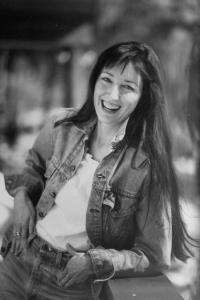Deborah Joy Corey

Photo: workman.com
Deborah Joy Corey (novelist) was born in 1958 in Temperance Vale, New Brunswick, to her mother (a homemaker) and father Gordon Corey (a lumber executive at a local mill). Corey is the sixth of seven children. She grew up in a small farming and logging community in York County. At the age of seventeen, Corey left her home and moved to Toronto in hopes of pursuing a career in modelling. After becoming ill with mononucleosis and rheumatic fever, she returned home to her family to recover.
Following her recovery, she met her future husband, Bill Zildjian, one of the two brothers who run the well-known Zildjian cymbals business in Meductic, New Brunswick. In 1984, the newlyweds took a year-long tour of Switzerland. In their apartment, Corey found a copy of The Wheel of Love, a collection of short stories by Joyce Carol Oates. She said of that discovery: “I’d never read stories like that. I decided then that I wanted to write.” This moment was the beginning of Corey’s literary career. Corey and her husband Bill now live in the small coastal village of Castine, Maine, where they have resided for fifteen years.
Corey did not officially attend university, although her parents wanted her to attend the University of New Brunswick after high school. After establishing a career in writing, she attended Harvard University’s Extension Programme Writing Workshop taught on Thursday evenings by Pamela Painter. It was during this time that Corey began to gain recognition for her work, which was published in literary journals and magazines, including Ploughshares, the literary journal of Emerson College in Boston, and The Carolina Quarterly.
Some of Corey’s primary influences have been Emily and Charlotte Brontë, Flannery O’Connor, Emily Dickinson, Joyce Carol Oates, Carol Shields, and Elizabeth Bishop. An additional influence, which has featured largely in her writing, has been her connection to her rural upbringing. Her personal experience and understanding of life in a small community have consistently appeared in her work. Corey has explained how her family would often tell stories during lunch and supper, an oral tradition that eventually informed her work.
Corey’s most recognized works are her novels Losing Eddie (1993) and The Skating Pond (2003). Losing Eddie, which won the 1993 Smith Book/Books in Canada “First Novel” award, is set in rural New Brunswick. One reviewer in Maclean’s magazine noted that this book’s strength is its “clear-eyed recreation of how it feels to be a child.” Corey’s second novel, The Skating Pond, originally began as a short story and has received favorable reviews from many sources, including the New York Times and People magazine. Both novels draw from Corey’s experiences in Castine, Maine, and from her youth in New Brunswick. The major themes throughout Corey’s writing are her use of young narrators and the guilt that her young female narrators possess. She chooses young narrators because of the ability of young children to “cut right to the bone.” She exposes life within an enclosed community: how it can be challenged by outsiders, how it includes inherent tensions, and how crisis can shape the formation of individuals while strengthening families.
Pamela Carvell, Winter 2008
St. Thomas University
Bibliography of Primary Sources
Corey, Deborah Joy. Losing Eddie. Chapel Hill, NC: Algonquin Books, 1993.
---. The Skating Pond. Toronto: A.A. Knopf Canada, 2003.
Bibliography of Secondary Sources
“About this Author: Deborah Joy Corey.” BookClubs.ca. 25 Nov. 2008
<https://www.penguinrandomhouse.ca/book-club-resources>.
“Author Interview: Deborah Joy Corey.” BookClubs.ca. 25 Nov. 2008
<https://www.penguinrandomhouse.ca/book-club-resources>.
Bemrose, John. “Bittersweet Childhood.” Maclean’s 4 Nov. 1994: 64.
Deziel, Shanda.“Books: A Tale that Hits You Like a Puck in the Face.” Maclean's 7 Mar. 2003: 54. 19 Nov. 2009
<https://archive.macleans.ca/article/2003/3/17/books>.
Hampson, Sarah. “The Only Road Back is Fiction.” Globe and Mail 15 Mar. 2003: R3.
Lesher, Linda Parent. The Best Novels of the Nineties: A Reader’s Guide. Jefferson, NC: McFarland, 2000. 12.
“Losing Eddie.” Maclean’s 11 Apr. 1994: 64. 23 Nov. 2008
<https://archive.macleans.ca/article/1994/4/11/bittersweet-childhood>.
Painter, Pamela. “Deborah Joy Corey.” Ploughshares 14.2/3 (1988): 145.
Ross, Val. “Starting with 'A Voice' IN PERSON/ Deborah Joy Corey Last Night Won the 1993 Smithbooks/Books First Novel Award for Losing Eddie.” Globe and Mail 24 Mar. 1994: E3. 17 Nov. 2008
<https://www.theglobeandmail.com/>.
Rudd, Andrew. “Corey, Deborah Joy, 1958-” Literature Online Biography. 2007. 7 Nov. 2008
<https://www.gale.com/c/literature-dictionary-of-literary-biography>.
Scott, Whitney. “Corey, Deborah Joy. The Skating Pond.” Booklist 15 Dec. 2002: 731. 23 Nov. 2008
<https://link.gale.com/apps/doc/A96072285/CPI?u=fred46430&sid=CPI&xid=ffa605ef>.
Zaleski, Jeff. “The Skating Pond.” Publishers Weekly 9 Dec. 2002: 61-2. 17 Nov. 2009
<https://link.gale.com/apps/doc/A95628197/CPI?u=fred46430&sid=CPI&xid=6c8ae623>.


